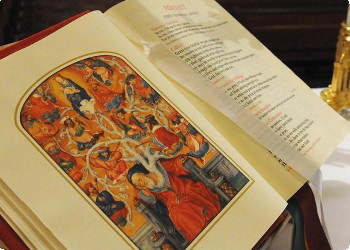Martha, Martha, you are anxious and worried about many things
21 JULY (Lk 10,38-42)
Ancient Scripture outlines the portrait of the ideal woman. It is an entirely immanent vision of life. It lacks the vision of transcendence, of the supernatural and of the full truth. In this portrait the woman is an actress in life, she is not yet a contemplator of the mystery that God wants to live in her and for her in the perfection of her truth.
When one finds a worthy wife, her value is far beyond pearls. Her husband, entrusting his heart to her, has an unfailing prize. She brings him good, and not evil, all the days of her life. She obtains wool and flax and makes cloth with skillful hands. Like merchant ships, she secures her provisions from afar. She rises while it is still night, and distributes food to her household. She picks out a field to purchase; out of her earnings she plants a vineyard. She is girt about with strength, and sturdy are her arms. She enjoys the success of her dealings; at night her lamp is undimmed. She puts her hands to the distaff, and her fingers ply the spindle. She reaches out her hands to the poor, and extends her arms to the needy. She fears not the snow for her household; all her charges are doubly clothed. She makes her own coverlets; fine linen and purple are her clothing. Her husband is prominent at the city gates as he sits with the elders of the land. She makes garments and sells them, and stocks the merchants with belts. She is clothed with strength and dignity, and she laughs at the days to come. She opens her mouth in wisdom, and on her tongue is kindly counsel. She watches the conduct of her household, and eats not her food in idleness. Her children rise up and praise her; her husband, too, extols her: “Many are the women of proven worth, but you have excelled them all.” Charm is deceptive and beauty fleeting; the woman who fears the Lord is to be praised. Give her a reward of her labors, and let her works praise her at the city gates (Pr 31,10-31).
We can picture this woman with the Old Testament. In it, matter still has the upper hand on the most pure spirituality of man. The good exists, it is done, but it is still a not perfectly purified good. There is not yet the truth of poverty in spirit, of this full and complete delivery of life to God so that He is the one to write for us his plan of love to be accomplished in our lives. However, we must begin from here in order to raise the perfect spiritual edifice. The foundation is there and it is also good. Now we must think of raising the spiritual, perfect and real home according to God.
Marta is still this old woman of the Old Testament. She is interested in matter. She thinks about the things of this world, of the earth. She busies herself to the impossible to be able to please and be pleasing to her friend Jesus. In the end she fails in her intent and she gets angry, loses her patience, she complains and accuses Jesus of little respect and little regard for her. She is really busy and her sister is there listening to the Master, sitting at his feet. This is not true life. On the contrary, hers is a true life, because it is supremely practical. Theirs instead is an abstract life, outside of any real historical context. One should not really behave like that. Mary must also work.
As they continued their journey he entered a village where a woman whose name was Martha welcomed him. She had a sister named Mary (who) sat beside the Lord at his feet listening to him speak. Martha, burdened with much serving, came to him and said, “Lord, do you not care that my sister has left me by myself to do the serving? Tell her to help me.” The Lord said to her in reply, “Martha, Martha, you are anxious and worried about many things. There is need of only one thing. Mary has chosen the better part and it will not be taken from her.”
Jesus hears the words of Martha. He also lets himself be scolded by her and tells her nothing. He does not reprimand her because she reproached him. He reprimands her because she is still half-foolish. She lives a not yet purified, not elevated and not sanctified love. Hers is still an impure love, because it is a love that flows from the heart of man and not from God’s heart. God is the one and only source of true love and it is always in God that it must be drawn. Jesus is the Mediator of this pure and holy love. Even Martha has to sit at the feet of Jesus to learn what true love is according to which she must later immerse herself in the daily reality for her sanctification.
Virgin Mary, Mother of the Redemption, Angels and Saints teach us this pure love.





